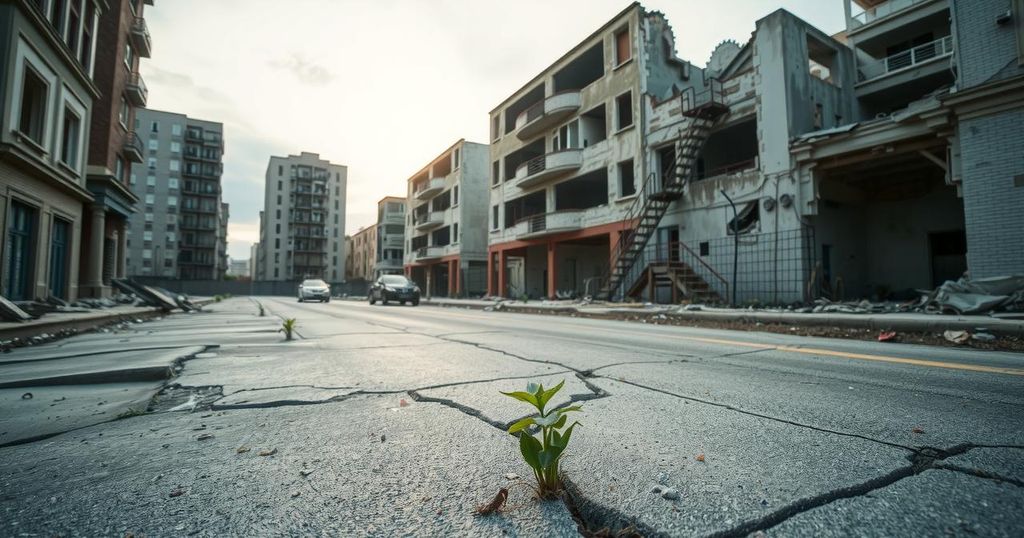Syria’s Path to Recovery: Challenges in Rebuilding Jobar
Amid the devastation in Jobar, Bashar Al Assad and Asma Al Assad’s visit symbolizes a contentious narrative of recovery post-civil war, wherein local residents grapple with lost property rights and economic instability under HTS rule. As Syria aims for reconstruction, critical challenges encompass securing international support, establishing trustworthy governance, and overcoming extensive infrastructure damage. Current rebuilding efforts face skepticism, as the legacy of war leaves communities marginalized and uncertain about their futures.
In December, before facing regime change, Bashar Al Assad and his wife Asma visited Jobar, a town near Damascus severely affected by the civil war. This area was subjected to considerable destruction, with Assad’s forces conducting a prolonged siege that left nearly every building in ruins. Following Jobar’s surrender, the regime organized art students to create sculptures glorifying the very troops that devastated the town, while Assad presented this artistic endeavor as a celebration of “martyrdom and peace.”
According to local residents like Haitham Al Bakhit, the extensive damage in Jobar symbolizes the significant challenges associated with Syria’s reconstruction. This rebuilding effort necessitates not only vast financial investment but also international consensus. The region’s new rulers, Hayat Tahrir Al Sham (HTS), struggle with funding and essential resources, exacerbated by a volatile economy and an exodus of skilled workers.
A United Nations report indicates that one-third of Syrian housing was either damaged or destroyed during the conflict. The Assad regime’s history of arbitrary governance created a convoluted property market, complicating the restoration of ownership and occupancy rights in devastated areas. Recent attempts by former Jobar residents to investigate property ownership have revealed the precariousness of property rights.
Upon returning from his relocation to Idlib, Mr. Al Bakheet noted that while he attempts to reconnect with Jobar, signs of recovery remain scant. The region’s desolation is punctuated by efforts from some individuals seeking to acquire the property and land, risking a future where locals may be permanently displaced.
Furthermore, the newly established leadership under Ahmad Al Shara endeavors to rebuild the nation while grappling with severe economic constraints. Promises to reform post-Assad Syria are being made, but any substantial rebuilding hinges on facilitating sustainable governance that can attract international assistance. Without strategic decisions to widen participation in governance and engage competent officials, challenges will persist.
While some Western nations have begun easing sanctions previously imposed during the Assad administration, the financial disparity remains vast. Syrian assets are largely frozen, and new aid brightens the prospects yet falls short of the estimated funds needed for revitalization. As both the political and economic landscapes unfold, skepticism persists regarding HTS’s capability to foster communal trust and foreign investment.
Residents express concerns that if opportunistic profiteers seize control, the dream of returning to Jobar will vanish. The process of property acquisition remains fraught with apprehension, and ongoing HTS intervention in municipal affairs hinders economic stability and development.
The potential for large-scale reconstruction projects appears dim as security risks continue to deter investors. Local businesses remain cautious, given uncertainties surrounding governance and related infrastructure upgrades. Consequently, rebuilding efforts may lean towards privatized approaches, with individuals taking on responsibilities for essential services that would typically fall under the purview of government.
The recovery of Syria, particularly Jobar, faces enormous obstacles rooted in destruction from the civil war and complicated by a tumultuous political landscape. Reconstruction necessitates significant international collaboration, commitment to governance reform, and the establishment of economic stability, which are currently hindered by HTS rule and lingering distrust among the population. Real solutions remain elusive, with fears that the absence of effective regulation could lead to disenfranchisement of original residents.
Original Source: www.thenationalnews.com




Post Comment